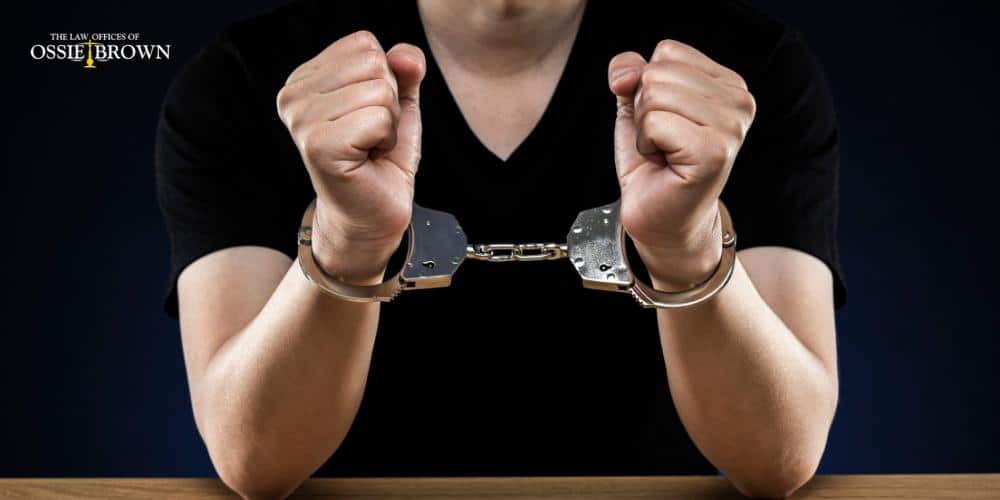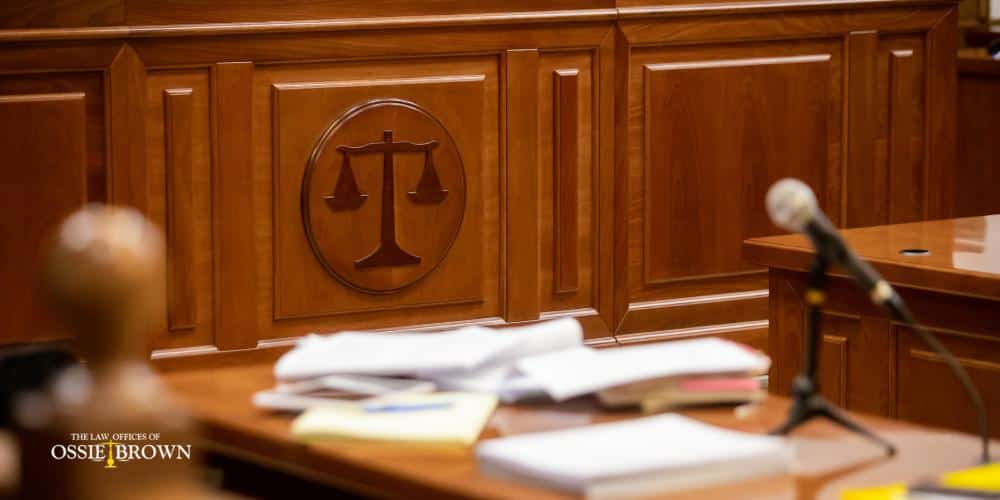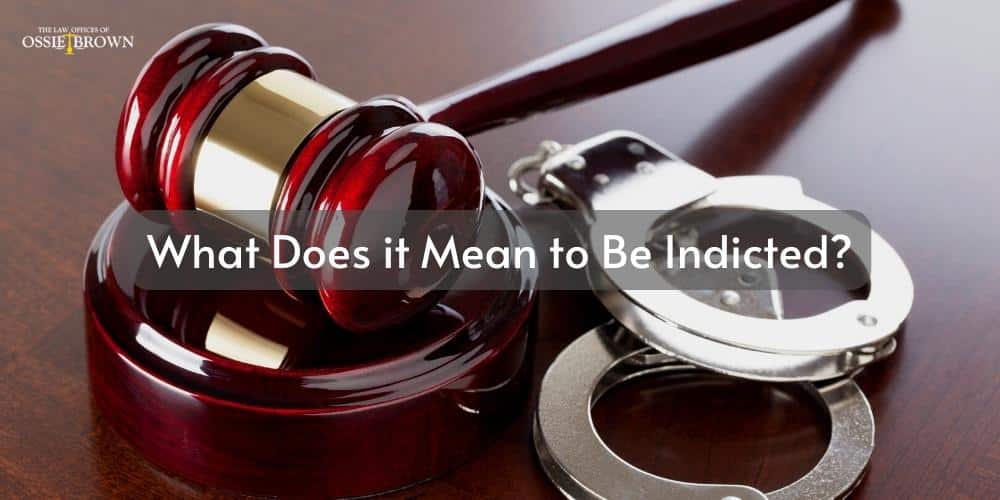If you’re a fan of true crime documentaries, you may have heard the term “indictment” before, usually in reference to a serious crime. But because the criminal justice system is quite complex and confusing, you may be wondering: what does it mean to be indicted? Indictments are similar to criminal charges in that they start a criminal case. An indictment means that a state or federal grand jury has found probable cause – based on the evidence presented – to accuse a suspect of committing a crime. It’s important to note that indictments are still different from criminal charges and convictions. We will explain all this and more below.
If you have been charged with a felony crime, it’s crucial to seek legal help. The Baton Rouge criminal defense lawyers at the Law Offices of Ossie Brown have decades of combined experience in defending clients charged with a wide variety of crimes, including aggravated assault, domestic violence, drug crimes, white collar crimes, theft crimes, sex crimes, and so much more.
Call 225-343-1111 to schedule a free consultation with our legal team today.
What is an Indictment?
An indictment is a formal accusation against a suspect in a criminal case. So – what does it mean to be indicted? Being indicted basically means that you’re charged with a crime – usually a felony crime, not a misdemeanor – and that you will have to participate in a criminal trial. A grand jury files an indictment at the end of their investigation on the suspect and the crime in question.
In many cases, a state or federal grand jury indictment will happen prior to an arrest.
What Are Grand Jury Proceedings?
In order to fully understand both an indictment and a grand jury proceeding, you must know about the Fifth Amendment to the U.S. Constitution. Basically, the Fifth Amendment lays out people’s rights in both criminal and civil cases. More specifically, the Fifth Amendment states this:
“No person shall be held to answer for a capital, or otherwise infamous crime, unless on a presentment or indictment of a grand jury, except in cases arising in the land or naval forces, or in the militia, when in actual service in time of war or public danger; nor shall any person be subject for the same offense to be twice put in jeopardy of life or limb; nor shall be compelled in any criminal case to be a witness against himself, nor be deprived of life, liberty, or property, without due process of law; nor shall private property be taken for public use, without just compensation.”
In simpler terms, the Fifth Amendment requires the federal government to provide a grand jury proceeding for all suspects of felony crimes.
Now – what is a grand jury proceeding? It’s basically a legal process where a jury – made up of local community members – decides whether there is sufficient evidence to indict someone for a criminal offense. Grand juries are private, meaning that the suspect and other members of the public generally don’t know about it. Judges and criminal defense lawyers are also not involved in a grand jury proceeding.
Grand jury members must look at all the evidence presented and determine whether there is probable cause to believe that a suspect committed a crime. If there is enough evidence to believe that a suspect committed a crime, then the jury will issue an indictment. A grand jury indictment is also frequently called a “true bill.” On the other hand, “no bill” means that there isn’t sufficient evidence to believe that a suspect committed a crime.
Are Grand Jury Indictments Required in Every State?
Grand juries are common in felony offenses on the state and federal level. However, grand juries are the most common in federal crimes.
Not every state is required to use a grand jury in order to file an indictment against a suspect. Louisiana happens to be one of the 23 U.S. states that requires grand jury indictments for serious crimes.
Meanwhile, 25 states state that grand jury indictments are optional for serious crimes. Lastly, two states (Pennsylvania and Connecticut) don’t use grand jury indictments for criminal cases. But, these states do use grand juries for the sake of investigation.
Indictment vs. Criminal Charge
It’s important to remember that state and federal indictments are different from criminal charges due to origination.
A grand jury decides on an indictment while a prosecutor decides on a criminal charge. Both an indictment and a criminal charge are the same in that a criminal case begins after they are issued.
Prosecutors can file charges in both misdemeanor and felony cases. Once a prosecutor charges a suspect with a crime, they will then fill out a criminal complaint. A criminal complaint is basically a court charging document that describes the specifics of a charge, including why they believe you should be charged at all.

Is an Indictment the Same as a Conviction?
Does an indictment mean jail time?
No, an indictment is not the same as a conviction. A conviction basically means that a suspect has been found guilty of a crime after a prosecutor or a grand jury filed charges against them.
So if you are charged with a crime, it must then be proven beyond a reasonable doubt that you committed the crime before you are officially convicted. A conviction also occurs if the suspect pleads guilty or accepts a plea deal. If the jury can’t decide unanimously that you committed a felony crime beyond a reasonable doubt, then you likely won’t be convicted of that crime.
“Beyond a reasonable doubt” requires much more evidence – and a higher standard of evidence – than the probable cause standard, which is what a grand jury uses to indict someone.
What Happens After an Indictment?
As previously stated, a criminal case begins after the indictment process. The suspect then becomes the defendant. If the defendant hasn’t already been arrested for their alleged crime, then they will likely be arrested immediately following the indictment process.
The defendant will then attend a preliminary hearing, which is often called a “mini trial” or a “probable cause hearing.” These hearings are generally only necessary for felony crimes, not misdemeanor crimes. During this hearing, the prosecution will present evidence and determine whether there is enough evidence to warrant a trial. Additionally, a criminal defense lawyer will often use these hearings to negotiate a plea bargain for their client. It’s important to note that a defendant can choose to waive a preliminary hearing.
If everyone decides that there is enough evidence to proceed to an actual criminal trial, then that will happen within a set number of days. Federal courts require criminal trials to occur within 70 days, but specific state courts may set different timelines. If the defendant accepts a plea deal or waives their right to a speedy trial, then the trial does not have to happen within the set timeframe.

Call Baton Rouge Criminal Defense Lawyers at The Law Offices of Ossie Brown Today
If you have been charged with a felony crime, you need strong legal representation on your side. A Baton Rouge criminal defense attorney at the Law Offices of Ossie Brown can defend your legal rights and help you achieve the best possible case outcome after you receive formal charges and/or indictments. Call 225-343-1111 to schedule a free consultation with our experienced legal team today.


